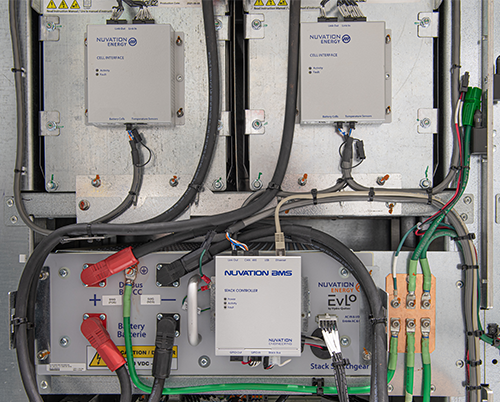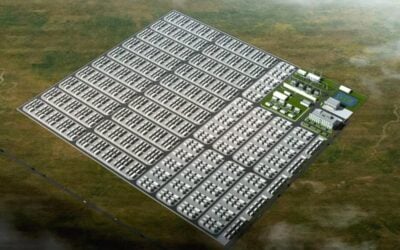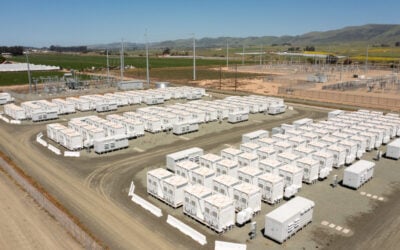
Battery energy storage system (BESS) products suitable for utility and large industrial applications have been launched by Powin Energy and Hydro-Quebec subsidiary EVLO.
Powin Energy is one of the more established names in the sector with more than 1,200MWh of systems built and delivered to date and a contracted pipeline to supply more than 4,500MWh of BESS in the next three years.
Enjoy 12 months of exclusive analysis
- Regular insight and analysis of the industry’s biggest developments
- In-depth interviews with the industry’s leading figures
- Annual digital subscription to the PV Tech Power journal
- Discounts on Solar Media’s portfolio of events, in-person and virtual
The company has launched its first-ever modular battery storage platform, called the Centipede, which allows for the end-to-end stacking of BESS units, able to accommodate more than 200MWh of capacity within a footprint of a single acre. Centipede BESS projects will be created from Powin’s new Stack750E units.
EVLO meanwhile is a much newer entrant to the business, launched by Canadian provincial government-owned utility Hydro-Quebec towards the end of 2020 to serve the battery storage sector.
It has now launched the EVLO1000, an 8.84m x 1.82m BESS unit, which has 1MWh capacity and uses lithium iron phosphate (LFP) batteries.
Powin’s Centipede
Powin debuted its Stack range of products in 2020 and added to it with a high voltage unit in April this year.
The company said the newest addition designed for use in the Centipede hardware platform, Stack750E, can be controlled and monitored as part of a large-scale system as well as independently. Powin did not specify which types of battery cell and other equipment it can be used with, but said it can accommodate a wide range of configurations and energy specifications and can be augmented.
The company does have long-term LFP battery cell supply deals in place with large China-headquartered manufacturers CATL and EVE Energy and has said that it wants to be able to source cells domestically in the US in future.
With Powin claiming it is well-suited to applications requiring 2-hour to 4-hour duration, Centipede contains batteries, thermal management equipment and essential safety systems.
Mass production will begin at the end of the first quarter of 2022, for deliveries to start the following quarter. More than 2GWh of Centipede orders have been contracted and awarded already from customers that include independent power producers (IPP) and utilities.
The Stack750E finished undergoing independently verified fire testing in November to UL standards from Energy Safety Response Group (ESRG).
ESRG founding principal Nick Warner said the large-scale fire tests were among the first in the industry to exceed UL9540A requirements, with preliminary findings showing a “tremendous amount of resistance to ‘unit to unit’ propagation during even a worst-case fire scenario”.
Earlier this year Powin secured over US$100 million in equity investment to advance its integrated hardware and software platform technologies.

EVLO1000
EVLO said the first project to use EVLO1000 will be a high voltage transmission line upgrade in Quebec’s Haute-Mauricie region. The energy storage technology will support the region’s power supply network while work on the transmission infrastructure is underway.
Although it is a new company, EVLO said it can lean on four decades of R&D work by its parent company. This also enables it to provide customers with large-scale test bed facilities.
Like Powin, EVLO also talked up the safety design aspects of its new product. It said the EVLO1000 is fitted with more than 200 real-time temperature monitoring sensors, ultrafast hydrogen emissions detection, an active ventilation system and dry-pipe sprinklers.
Silicon Valley-headquartered energy tech company Nuvation Energy said that it will be providing the battery management system (BMS) to EVLO’s energy storage product line. A resell agreement is also in place so that Nuvation can market and sell EVLO solutions.
Nuvation’s BMS is designed for large-scale high voltage applications and is configurable to most types of battery.
“A highly reliable battery management system is a critical component of any energy storage system. During our extensive testing, Nuvation Energy’s BMS proved to be excellent not only for battery protection, but also as a valuable energy storage system management tool,” EVLO president and CEO Guillaume Hayet said.
Verdict: Solutions join a competitive field
The pair’s BESS solutions join an increasingly competitive field of technology providers, manufacturers and system integrators.
Over the past year and a half or so, new large-scale advanced BESS product launches to the international market have come from companies including Wärtsilä, Pylon Tech, Fluence, Sungrow, LS Power, Tesla, Saft, Leclanché and more.
The systems are being marketed with increasing claims of modularity and / or integration, ease of installation processes and logistics, lowered costs and of course safety.
It will be interesting to see what the key differentiators will be from the customer perspective in the coming months and years and whether those will be primarily technical or based around factors like bankability and robustness of supply chains.






